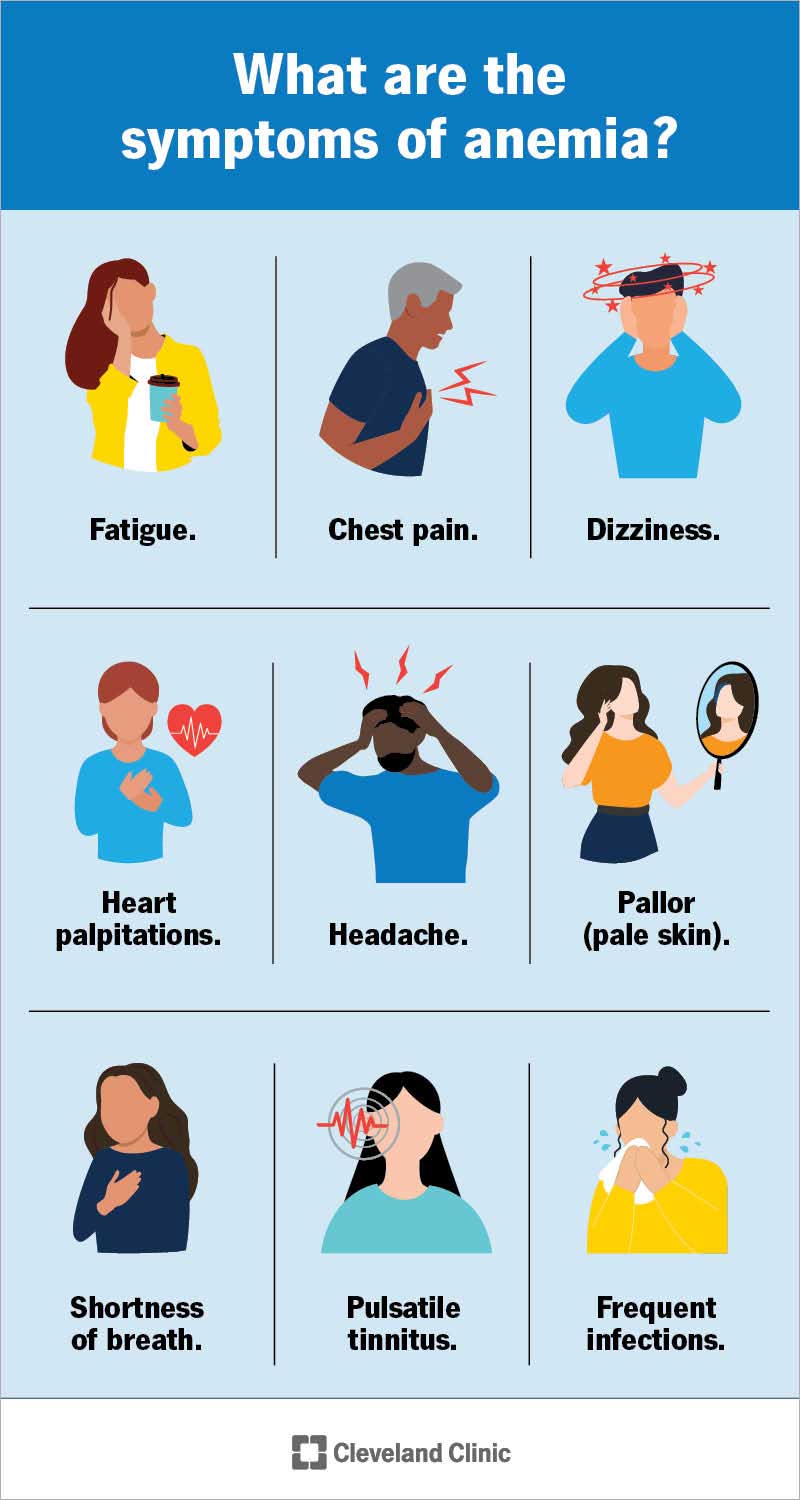Anemia is when you have low levels of healthy red blood cells to carry oxygen throughout your body. Symptoms include fatigue, weakness and feeling short of breath. They can be mild or severe. Anemia may be life-threatening. Many things may cause it and there are different types of the condition. Treatment varies depending on why you have anemia.
Advertisement
Cleveland Clinic is a non-profit academic medical center. Advertising on our site helps support our mission. We do not endorse non-Cleveland Clinic products or services. Policy

Image content: This image is available to view online.
View image online (https://my.clevelandclinic.org/-/scassets/images/org/health/articles/anemia)
Anemia is a blood disorder that happens when you don’t have enough red blood cells or your red blood cells don’t work as they should. Some types of anemia are inherited, but people may also acquire or develop the condition during their lifetimes.
Advertisement
Cleveland Clinic is a non-profit academic medical center. Advertising on our site helps support our mission. We do not endorse non-Cleveland Clinic products or services. Policy
Anemia can affect your life in different ways. Some types of this condition have mild symptoms that ease with treatment. Other types are more serious, like some that people inherit that cause lifelong medical issues. Severe anemia can be life-threatening. This condition may also be a symptom of serious conditions like cancer.
Yes, it is. Experts estimate that 3 million people in the U.S. have anemia. They also estimate the condition affects 1 in 3 people in the global population.
Video content: This video is available to watch online.
View video online (https://cdnapisec.kaltura.com/p/2207941/sp/220794100/playManifest/entryId/1_8scm25qo/flavorId/1_5f3sgelj/format/url/protocol/https/a.mp4)
Learn five common causes of anemia.
Fatigue — feeling too tired to manage your activities — is the most noticeable anemia symptom. Other symptoms may include:
Many things can cause it. For example, iron-deficiency anemia is the most common type of anemia. You can develop this type if you don’t get enough iron from the food you eat, or if you lose blood from an injury or illness. Healthcare providers classify anemia as being acquired or inherited.
You develop or acquire anemia from something that happens during your lifetime, like a condition that causes it. Acquired anemias include:
Advertisement
You can also develop anemia if you have certain chronic diseases. Anemia may be a symptom or complication of the following:
An inherited anemia is when you’re born with the condition. Inherited anemias include:
Some types of anemia may be inherited but can also be acquired:
Your healthcare provider will ask questions about your symptoms. As anemia happens when you don’t have enough healthy red blood cells, they’ll do blood tests, including:
Advertisement
Chronic anemia can cause serious medical issues like heart attack, heart failure and organ damage. Chronic anemia is anemia that healthcare providers don’t diagnose and treat or that continues despite treatment.
Your treatment will vary depending on the cause. If you have anemia because you have an underlying condition, your provider will treat that condition. But they may also do the following treatments specifically for anemia. Treatments may include dietary supplements or medications.
Advertisement
Your provider may recommend the following supplements for anemia:
Providers may prescribe medications for anemia, including:
Procedures
In some cases, your provider may recommend:
Most of the time, anemia causes mild symptoms and is a short-term issue that you may be able to manage by changing your diet or taking supplements once a healthcare provider concludes that anemia is the reason why you have certain symptoms.
Advertisement
But anemia may cause symptoms similar to those of other diseases. For example, something other than anemia may be why you feel exhausted no matter how much rest you get.
Talk to your healthcare provider if you have fatigue or other changes in your body that don’t go away within two weeks. They’ll find out what’s causing your symptoms and treat the condition.
That depends on your situation. Treatment may manage anemia symptoms. But many things can cause it, like incurable inherited disorders and chronic diseases. Chronic anemia, like anemia that goes without treatment, can cause serious complications, including organ damage. If you have anemia, ask your healthcare provider what you can expect.
You may be able to prevent the most common type of anemia, iron-deficiency anemia, by including iron-rich foods in your everyday meals and snacks. But there are other types of anemia you can’t prevent, including inherited disorders.
While some types of anemia are short-term and mild, others can last a lifetime. Regardless, there are several things you can do to help manage symptoms. Here are some suggestions:
If you have anemia, you should check with your provider if your symptoms get worse despite treatment or if you notice changes in your body that may be new symptoms.
Anemia may increase your risk of a heart attack. Call 911 if you have the following symptoms:
Anemia may affect your body in many ways. It may happen for many different reasons. If you have anemia, here are some questions you may want to ask your healthcare provider:
Anemia happens when you don’t have enough red blood cells or your red blood cells aren’t working as well as they could. Some people are born with forms of anemia, but most people who have anemia develop the condition over time. That’s why it’s important to keep track of changes in your body. For example, we all have days when we feel worn out. But if you’re feeling very tired for several days despite getting rest, consider talking to your healthcare provider.
Learn more about the Health Library and our editorial process.
Cleveland Clinic's health articles are based on evidence-backed information and review by medical professionals to ensure accuracy, reliability, and up-to-date clinical standards.
Cleveland Clinic's health articles are based on evidence-backed information and review by medical professionals to ensure accuracy, reliability, and up-to-date clinical standards.
Living with a noncancerous blood disorder can be exhausting. But there’s hope. Cleveland Clinic’s classical hematology experts provide personalized care and support.
